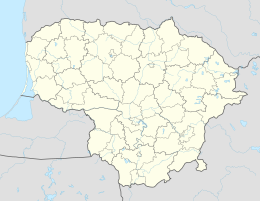Plikiai
| Plikiai | ||
| State : |
|
|
| District : | Klaipeda | |
| Rajong municipality : | Kretinga | |
| Office : | Kretingalė | |
| Coordinates : | 55 ° 47 ′ N , 21 ° 17 ′ E | |
| Inhabitants (place) : | 607 (2011) | |
| Time zone : | EET (UTC + 2) | |
| Postal code : | LT-96014 | |
| Status: | Town | |
|
|
||
Plikiai ( German Plicken ) is a small town ( miestelis ) in the district ( seniūnija ) Kretingalė of the Rajongemeinde Kretinga in the Lithuanian district of Klaipėda . The population was 607 in 2011. Before 1919 or 1945 it was a municipality in what was then the Prussian district of Memel .
history
In 1891 Plicken was raised to a parish through the construction of the Protestant church, which ended in 1896. Before that, the rural settlement belonged partly to the parish of Memel and partly to the parish of Deutsch Crottingen . During the tenure of the local pastor Peter Felix Žematait , the rectory was also built in 1896. In 1928 Johann Tennigkeit became his successor. In 1906 the community received a small train connection to the city of Memel. During the Lithuanian occupation , the Catholic Šv. Šeimos - Jėzaus, Marijos ir Juozapo bažnyčia (Church of the Holy Family - Jesus, Mary and Joseph). In 1925 Plicken had 996 inhabitants.
As of 1944, the German population fled the village due to the invasion of the Red Army in East Prussia . However, many families did not make it in time or were forced to turn back while fleeing because the overland route into the German Reich near Elbing was cut off by the advance of the Red Army . Most of these were then expelled or deported between 1945 and 1953 after their incorporation into the Soviet Union . For example, under Soviet management, land was redistributed and the many vacant farmsteads were gradually taken over by resettled Lithuanians ( Schemeitia ). Religious and ethnic differences therefore led to tensions in many places between the predominantly Protestant Memel countries and the Catholic new settlers. In the course of denazification , the German language was banned and the local cultural area was “Lithuanian”. As part of negotiations between Konrad Adenauer and the moderate Khrushchev government, from 1958 the last remaining Germans in all former eastern regions , including Plicken, were able to apply for relocation to the FRG.
During the Soviet era, the buildings and the cemetery in the place were left to decay. After the fall of the Wall, after initial reservations, they were restored in a Lithuanian-German collaboration. The most important local employer today is the UAB Sakuona timber and furniture plant .
Sports
- FK Sakuona Plikiai (ball sports club, formerly SV Plicken, founded in 1919)
- FK Klarksonas-Plikiai (football club)
literature
- Martin Klumbies: Awakening and Church Struggle. Memories of a pastor from Memelland. Stefan Zehle Verlag, 1998
- Ewald Rugullis: Memories of a German border region on the Memel. 2000
Web links
- http://wiki-de.genealogy.net/Plicken with current pictures
- http://www.annaberger-annalen.de/


